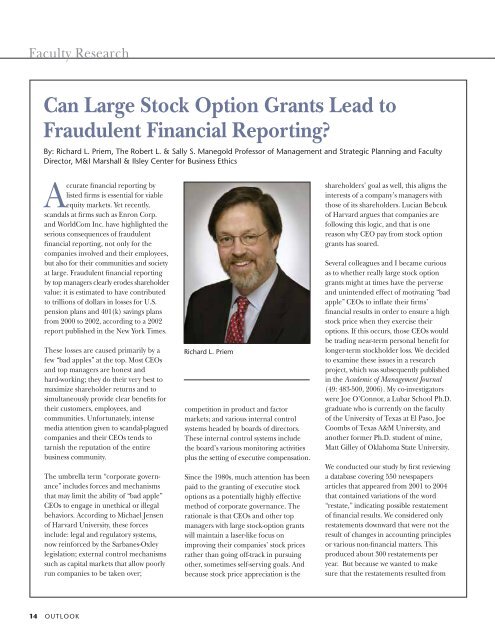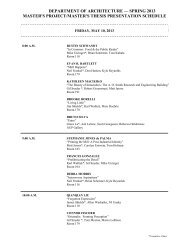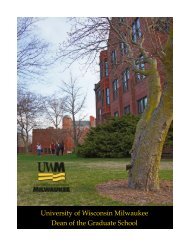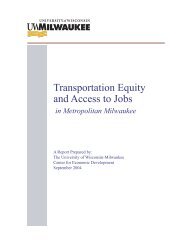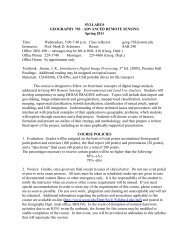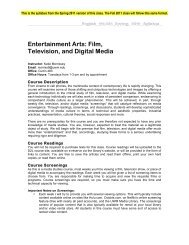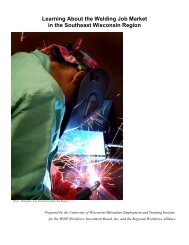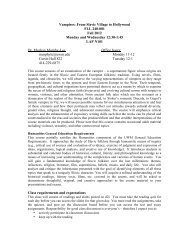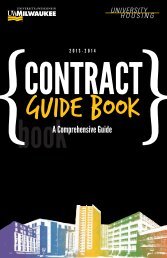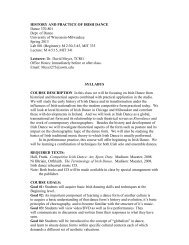Profiles in Leadership - UW-Milwaukee
Profiles in Leadership - UW-Milwaukee
Profiles in Leadership - UW-Milwaukee
You also want an ePaper? Increase the reach of your titles
YUMPU automatically turns print PDFs into web optimized ePapers that Google loves.
Faculty Research<br />
Can Large Stock Option Grants Lead to<br />
Fraudulent F<strong>in</strong>ancial Report<strong>in</strong>g?<br />
By: Richard L. Priem, The Robert L. & Sally S. Manegold Professor of Management and Strategic Plann<strong>in</strong>g and Faculty<br />
Director, M&I Marshall & Ilsley Center for Bus<strong>in</strong>ess Ethics<br />
Accurate fi nancial report<strong>in</strong>g by<br />
listed fi rms is essential for viable<br />
equity markets. Yet recently,<br />
scandals at fi rms such as Enron Corp.<br />
and WorldCom Inc. have highlighted the<br />
serious consequences of fraudulent<br />
fi nancial report<strong>in</strong>g, not only for the<br />
companies <strong>in</strong>volved and their employees,<br />
but also for their communities and society<br />
at large. Fraudulent fi nancial report<strong>in</strong>g<br />
by top managers clearly erodes shareholder<br />
value: it is estimated to have contributed<br />
to trillions of dollars <strong>in</strong> losses for U.S.<br />
pension plans and 401(k) sav<strong>in</strong>gs plans<br />
from 2000 to 2002, accord<strong>in</strong>g to a 2002<br />
report published <strong>in</strong> the New York Times.<br />
These losses are caused primarily by a<br />
few “bad apples” at the top. Most CEOs<br />
and top managers are honest and<br />
hard-work<strong>in</strong>g; they do their very best to<br />
maximize shareholder returns and to<br />
simultaneously provide clear benefi ts for<br />
their customers, employees, and<br />
communities. Unfortunately, <strong>in</strong>tense<br />
media attention given to scandal-plagued<br />
companies and their CEOs tends to<br />
tarnish the reputation of the entire<br />
bus<strong>in</strong>ess community.<br />
The umbrella term “corporate governance”<br />
<strong>in</strong>cludes forces and mechanisms<br />
that may limit the ability of “bad apple”<br />
CEOs to engage <strong>in</strong> unethical or illegal<br />
behaviors. Accord<strong>in</strong>g to Michael Jensen<br />
of Harvard University, these forces<br />
<strong>in</strong>clude: legal and regulatory systems,<br />
now re<strong>in</strong>forced by the Sarbanes-Oxley<br />
legislation; external control mechanisms<br />
such as capital markets that allow poorly<br />
run companies to be taken over;<br />
14 OUTLOOK<br />
Richard L. Priem<br />
competition <strong>in</strong> product and factor<br />
markets; and various <strong>in</strong>ternal control<br />
systems headed by boards of directors.<br />
These <strong>in</strong>ternal control systems <strong>in</strong>clude<br />
the board’s various monitor<strong>in</strong>g activities<br />
plus the sett<strong>in</strong>g of executive compensation.<br />
S<strong>in</strong>ce the 1980s, much attention has been<br />
paid to the grant<strong>in</strong>g of executive stock<br />
options as a potentially highly effective<br />
method of corporate governance. The<br />
rationale is that CEOs and other top<br />
managers with large stock-option grants<br />
will ma<strong>in</strong>ta<strong>in</strong> a laser-like focus on<br />
improv<strong>in</strong>g their companies’ stock prices<br />
rather than go<strong>in</strong>g off-track <strong>in</strong> pursu<strong>in</strong>g<br />
other, sometimes self-serv<strong>in</strong>g goals. And<br />
because stock price appreciation is the<br />
shareholders’ goal as well, this aligns the<br />
<strong>in</strong>terests of a company’s managers with<br />
those of its shareholders. Lucian Bebcuk<br />
of Harvard argues that companies are<br />
follow<strong>in</strong>g this logic, and that is one<br />
reason why CEO pay from stock option<br />
grants has soared.<br />
Several colleagues and I became curious<br />
as to whether really large stock option<br />
grants might at times have the perverse<br />
and un<strong>in</strong>tended effect of motivat<strong>in</strong>g “bad<br />
apple” CEOs to <strong>in</strong>fl ate their fi rms’<br />
fi nancial results <strong>in</strong> order to ensure a high<br />
stock price when they exercise their<br />
options. If this occurs, those CEOs would<br />
be trad<strong>in</strong>g near-term personal benefi t for<br />
longer-term stockholder loss. We decided<br />
to exam<strong>in</strong>e these issues <strong>in</strong> a research<br />
project, which was subsequently published<br />
<strong>in</strong> the Academic of Management Journal<br />
(49: 483-500, 2006). My co-<strong>in</strong>vestigators<br />
were Joe O’Connor, a Lubar School Ph.D.<br />
graduate who is currently on the faculty<br />
of the University of Texas at El Paso, Joe<br />
Coombs of Texas A&M University, and<br />
another former Ph.D. student of m<strong>in</strong>e,<br />
Matt Gilley of Oklahoma State University.<br />
We conducted our study by fi rst review<strong>in</strong>g<br />
a database cover<strong>in</strong>g 550 newspapers<br />
articles that appeared from 2001 to 2004<br />
that conta<strong>in</strong>ed variations of the word<br />
“restate,” <strong>in</strong>dicat<strong>in</strong>g possible restatement<br />
of fi nancial results. We considered only<br />
restatements downward that were not the<br />
result of changes <strong>in</strong> account<strong>in</strong>g pr<strong>in</strong>ciples<br />
or various non-fi nancial matters. This<br />
produced about 300 restatements per<br />
year. But because we wanted to make<br />
sure that the restatements resulted from


